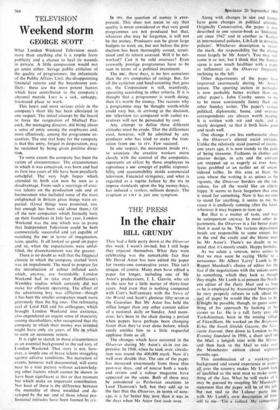TELEVISION
Weekend storm
GEORGE SCOTT
What London Weekend Television needs more than anything else is a respite from publicity and a chance to heal its wounds in private. A little compassion would not go amiss either. Savage public criticism of the quality of programmes; the infanticide of the Public Affairs Unit; the disappointing financial returns and the boardroom con- flicts : these are the most potent factors which have contributed to the company's abysmal morale. Lwr is a sick, unhappy, frustrated place to work.
This latest and most serious crisis in the company's short life has been alleviated in one respect. The initial attempt by the board to force the resignation of Michael Pea- cock, the managing director, did bring about a sense of unity among the employees and, most effectively, among the programme ex- ecutives. The one real hope for the company is that this unity, forged in desperation, may be sustained by being given positive direc- tion.
To some extent the company has been the victim of circumstances. The circumstances in which it was conceived, was born and had its first two years of life have been peculiarly unhelpful. The very high hopes which attended its birth can now be seen as a disadvantage. From such a marriage of crea- tive talents on the production side and of businessmen who included some of the most enlightened in Britain great things were ex- pected. (Great things were promised, too, but enough has been said about them.) Of all the new companies which formally took up their franchises in July last year, London Weekend was the one which was to prove that Independent Television could be both commercially successful and yet capable of matching the BBC in terms of imagination, taste, quality. It all looked so good on paper and so, when the expectations were unful- filled, the disenchantment was the greater.
There is no doubt as well that the fiwcial climate in which the-company started work was an impediment. The need to prepare for the introduction of colour inflated costs which, anyway, are formidable. London Weekend had to take over Rediffusion's Wembley studios which certainly did not make for efficient operating. The effect of the advertising levy was afflictive—though it has hurt the smaller companies much more grievously than the big ones. The reforming zeal of Lord Hill and his colleagues, which brought London Weekend into existence, also engendered an urgent sense of insecurity among shareholders, who recognised that the company in which their money was invested might have only six years of life hk which to earn an economic return.
It is right to sketch in those circumstances as an essential background to the sad sory of London Weekend. That story is not, how- ever, a simple one of brave talents struggling against adverse conditions. No narration of events, however well documented, will come near to a true picture without acknowledg- ing other factors which cannot be shown to have been significant at this or that moment but which make an important contribution. Not least of these is the difference between the mentality of those moulded and de- • veloped by the sac and of those whose pro- fessional attitudes haye been formed by rrv. In rrv, the question of money is ever- present. This does not mean to say that quality is never considered or that very good programmes are not produced but that, whatever else may be forgotten, it will not be the money. Producers can be given large budgets to work on, but not before the pro- duction has been thoroughly costed, scruti- nised and its return assessed. Will it be net- worked? Can it be sold overseas? Even avowedly prestige programmes have to be seen in terms of a political investment.
The six, these days, is no less conscious than the rry companies of ratings. But, for all the cynicism and head-counting that goes on, the Corporation is still, manifestly, operating according to other criteria. If it is thought that a programme is worth doing, then it's worth the money. The reasons why a programme may be thought worth-while could vary but, in arriving at the decision, BBC television (as compared with radio) ex- ecutives will not be persuaded by cost.
Any attempt to define these different attitudes must be crude. That the differences exist, however, will be admitted by any producer who has tried to make the tran- sition from sec to ITV. Few succeed.
In one respect, the movement inside rrv, to associate the creative workers more closely with the control of the companies, represents an effort by those employees to reproduce a sac concept of public responsi- bility and accountability inside commercial television. Financial stringency, and what is regarded as a supine failure by the rrA to impose standards upon the big money-boys, has induced a restless, militant despair. The eruption at Lyn is just one symptom.








































 Previous page
Previous page